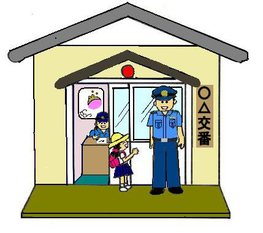Many Japanese Ask for Directions at Police Boxes
日本人の多くは交番で道を尋ねる
日本人の多くは交番で道を尋ねる
at - for - in - on - to - with
Though English may be displayed (1 ) street signs in Japan, in most cases the street name is only displayed (2 ) Japanese. When you lose your way, it’s best to ask a passerby.
日本の道路名の標識には英語も表記されていますが、多くは日本語のみです。道に迷ったときは、通行人に聞きましょう。
In the majority (3 ) cases people will helpfully tell you where to go. However, since people from different places gather (4 ) big cities, you will often come across people unfamiliar (5 ) the area.
たいていは親切に教えてくれるはずです。しかし、都会にはさまざまな地方から人が集まっているので、その人も詳しくないかもしれません。
Since there aren’t many Japanese able to speak English, instructions may be (6 ) broken English, but they will often take you (7 ) a point close to your destination.
英語が話せる日本人は限られているので片言英語での案内になるでしょうが、わかるところまで連れて行ってくれることもよくあります。
As there is usually a dedicated police box (8 ) each area in big cities, many Japanese ask (9 ) a nearby police box when they have lost their way.
都会には地域と密着した交番があるので、道がわからないとき多くの日本人は近くの交番で尋ねます。
日本の道路名の標識には英語も表記されていますが、多くは日本語のみです。道に迷ったときは、通行人に聞きましょう。
In the majority (3 ) cases people will helpfully tell you where to go. However, since people from different places gather (4 ) big cities, you will often come across people unfamiliar (5 ) the area.
たいていは親切に教えてくれるはずです。しかし、都会にはさまざまな地方から人が集まっているので、その人も詳しくないかもしれません。
Since there aren’t many Japanese able to speak English, instructions may be (6 ) broken English, but they will often take you (7 ) a point close to your destination.
英語が話せる日本人は限られているので片言英語での案内になるでしょうが、わかるところまで連れて行ってくれることもよくあります。
As there is usually a dedicated police box (8 ) each area in big cities, many Japanese ask (9 ) a nearby police box when they have lost their way.
都会には地域と密着した交番があるので、道がわからないとき多くの日本人は近くの交番で尋ねます。


 RSS Feed
RSS Feed